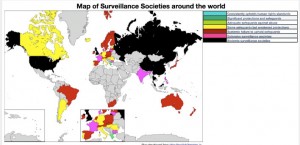Glenn Greenwald is a member of the Board of the Directors of a new organization called Freedom of the Press Foundation. Here's how Greenwald describes the mission:
The primary impetus for the formation of this group was to block the US government from ever again being able to attack and suffocate an independent journalistic enterprise the way it did with WikiLeaks. Government pressure and the eager compliance of large financial corporations (such as Visa, Master Card, Bank of America, etc.) has - by design - made it extremely difficult for anyone to donate to WikiLeaks, while many people are simply afraid to directly support the group (for reasons I explained here).
We intend to raise funds ourselves and then distribute it to the beneficiaries we name. The first group of beneficiaries includes WikiLeaks. We can circumvent those extra-legal, totally inappropriate blocks that have been imposed on the group. We can enable people to support WikiLeaks without donating directly to it by donating to this new organization that will then support a group of deserving independent journalism outlets, one of which is WikiLeaks. In sum, we will render impotent the government's efforts to use its coercive pressure over corporations to suffocate not only WikiLeaks but any other group it may similarly target in the future.
. . . I'm very excited to have participated in its formation and will serve as an unpaid member of the Board of Directors, along with the heroic whistleblower Daniel Ellsberg, 2012 McArthur-fellowship-receipient and Oscar-nominated documentarian Laura Poitras, co-founder of the Electronic Frontier Foundation John Perry Barlow, the actor and civil liberties advocate John Cusack, BoingBoing co-founder Xeni Jardin, and several other passionate free press and transparency activists.
David Carr of the New York Times recently wrote an article titled: "Group Aims to Be a Conduit for WikiLeaks Donations":
A group advocating a more transparent government has formed a nonprofit organization called the Freedom of the Press Foundation to serve as a conduit for donations to organizations like WikiLeaks. The goal is to insulate those groups’ fund-raising efforts from political and business pressures.
In December 2010, Visa, MasterCard and PayPal announced that they would no longer accept transactions for WikiLeaks, the online leak group that released thousands of secret documents from the American government. The move to cut off donations, which came after vocal protests against the organization’s activities from members of Congress, eliminated the vast majority of financing for WikiLeaks.
Michael Calderon of Huffpo is recently posted on FPF:
In an interview with The Huffington Post, Timm said the idea for the foundation grew out of conversations with fellow co-founders, Daniel Ellsberg, the whistleblower behind the Pentagon Papers, and John Perry Barlow, co-founder of the Electronic Frontier Foundation and a former Grateful Dead lyricist.
The foundation plans to direct tax deductible donations to WikiLeaks for as long as payment processors block the organization, while protecting other outlets if they are similarly targeted.
"WikiLeaks was the inspiration for it, but we wanted to make the mission much broader than WikiLeaks," Timm said.
For that reason, the group is also raising money for three other entities: MuckRock News, an open government organization; National Security Archive, an archive of declassified government documents; and The UpTake, a citizen-journalism news site.
Here is more on the four beneficiary organizations.
FDL's Kevin Gosztola writes:
[T]he idea had come from something that had been discussed for months. There was a “real sense that the blockade on WikiLeaks was censorship of not just of WikiLeaks but actually of the people who wanted to express their opinions by making donations.” It was a suppression of “their rights to free speech,” as well.
FPF decided to do something that would empower people to do something that could keep WikiLeaks operational while also inspiring a new generation of WikiLeaks-like organizations that would be resistant to government and corporate pressures.
Here's an excerpt from the About Page of Freedom of the Press Foundation:
The Freedom of the Press Foundation is dedicated to helping promote and fund aggressive, public-interest journalism focused on exposing mismanagement, corruption, and law-breaking in government. We accept tax-deductible donations to a variety of journalism organizations dedicated to government transparency and accountability.
The Freedom of the Press Foundation is built on the recognition that this kind of transparency journalism — from publishing the Pentagon Papers and exposing Watergate, to uncovering the NSA’s warrantless wiretapping program and CIA secret prisons — doesn’t just happen. It requires dogged work by journalists, and often, the courage of whistleblowers and others who work to ensure that the public actually learns what it has a right to know.
But in a changing economic and technological age, media organizations are increasingly susceptible to corporate or government pressure. This can lead to watered-down or compromised coverage, or worse: censorship.
Increasingly, non-profit media and transparency organizations are emerging as a critical component of the journalism landscape. Leveraging the power of the Internet, these organizations are helping to reinvent and reimagine independent watchdog reporting.
Right now, too many of those organizations are struggling for funding, relying on a few large foundations or competing for donors. Our goal is to broaden the financial base of these types of institutions—both start-ups and established non-profit organizations — by crowd-sourcing funding and making it easy for people to support the best journalism from an array of organizations all in one place.
Using the same networked, collaborative approach, the Freedom of the Press Foundation will also provide support for organizations and individuals that have been unjustly censored or cut off from funding for doing their job as journalists. Given the variety of corporate and government pressures on journalism outlets around the world, the need has never been greater.

